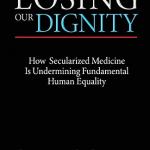Simple answer: no! The Pope did not say the Ten Commandments are relative. Complicated answer: let’s look at how an issue in translation and assuming the worst might lead someone to that idea. To do so, we’ll examine the Pope’s words, look at the differences in meaning between Italian and English, and finish with a point on charity.
Pope Francis: Jesus is Absolute
This tweet of a video from yesterday’s Wednesday audience has been going around:
At General Audience, Pope Francis asks two questions: “Do I live in the fear that if I don’t do this or that I will go to hell?”; and “Do I despise the Commandments? No. I observe them, but not as absolutes, because I know that what justifies me is Jesus Christ.” pic.twitter.com/nY7kRoon17
— Catholic Sat (@CatholicSat) August 18, 2021
Here’s my transcription / translation (I found the official translation after I posted this):
How do I Live? Do I live in the fear that I don’t do this or that I will go to Hell? Or do I live with that hope, with the gratuitousness in the salvation in Jesus Christ? That’s a beautiful question.
And a second [question]: Do I despise the Commandments? No. I observe them but not as “absolutes,” because I know that what justifies me is Jesus Christ. Thanks!
This is a beautiful reflection for the soul asking what we base our moral life on. However, some have had issue with the word “absolutes” there.
[Added after posting:] Further, as another user pointed, out, the wider context is helpful to understand it:Whoever posted this shared only half of the closing statement of the Wed Audience. How’re you supposed to judge a man’s words w/ justice w/out the full context. Read the preceding sentences & you’ll see that what the Pope is saying is perfectly orthodox. https://t.co/BuwtIoNNN5 pic.twitter.com/KxLPEo2NcJ
— Jozefina (@Jozefinaaaa_S) August 19, 2021
Different Meanings of “Absolute”

The meaning of the statement above is obvious to anyone who knows Catholicism: we observe the commandments fully, but they are not the highest and most independent rule of Christian life; love for Jesus, imitation of Jesus, and living with Jesus is the ultimate rule.
English Dictionary
The meaning of “absolute” Pope Francis intended here corresponds to the second definition in Merriam-Webster: “being, governed by, or characteristic of a ruler or authority completely free from constitutional or other restraint.” The opposite of this would be dependent. By analogy, in the USA, we should always obey laws like don’t steal what legitimately belongs to others but these aren’t the absolute legal authority, the constitution is.
The issue comes in if we insist on the first definition in English. Merriam-Webster states: “free from imperfection… free or relatively free from mixture… outright, unmitigated.” A particular reading using this definition might imply we don’t need to follow the commandments.
Italian Dictionary
However, it is worth noting he’s speaking Italian. I looked up the word “assoluto” in a standard Italian dictionary. If we look at it, the priority of various definitions is quite different from English. Here’s my translation:
A. 1 Loose, free from all constraints; which has no limit, no restriction: absolute freedom.
2 Who does not have, in his authority, ties of dependence: he is the absolute head of the company.
3 Taken on its own, without dependence or comparison: absolute temperature.
4 (extended) Full, whole, total: he had absolute need that money.
5 (extended) Universal: absolute principle.
6 (figurative) Which does not admit objections, delays and the like; peremptory, decisive: absolute duty.
B. (Philosophy) That which has unconditional reality, which has in itself its own reason for being.
You will notice that definition B is likely the most logical for context of what the Pope is saying. However, A1, A2, A3, and A4 also work to get his meaning across. But a definition that would mean “commandments are relative in the sense they need not always be obeyed,” which is how people are misunderstanding the Pope would require you to take A6, a definition considered figurative and really the least common use of the word in Italian.
Charity in Interpreting Others
The most obvious definitions of the words the Pope spoke in the language he spoke is referring to how we should obey the commandments, but that the ultimate measure of Christian life is Jesus not the commandments. In the Sermon on the Mount, Jesus points out his standard is above and beyond the Commandments. For example: “You have heard that it was said to the men of old, ‘You shall not kill; and whoever kills shall be liable to judgment.’ But I say to you that every one who is angry with his brother shall be liable to judgment; whoever insults his brother shall be liable to the council, and whoever says, ‘You fool!’ shall be liable to the hell of fire.” (Matthew 5:21-22)
However, even if the most obvious definitions of words were not what someone meant, we should look at other common meanings before condemning anyone. This should be all the more for people like the Pope or our bishop. If I said something like this in a homily, even in English where it could be more confusing, I would hope you’d all assume the second definition, not the first. We should always give people the benefit of the doubt.
It is against the VIII commandment and against charity to state that Pope Francis is saying that morality is always relativistic, claiming this shows the Pope is a heretic or similar. This is calumny. Let’s follow this commandment of truth and Jesus’ commandment of charity.
Conclusion: Follow the Commandments
At each confession and maybe more often we pray the Act of Contrition. It contains the lines, “I detest all my sins, because I dread the loss of Heaven and the pains of hell, but most of all because they offend thee, my God, who are all good and deserving of all my love.” This passage shows that God’s love, not the fear of Hell, should be the primary motivator in Christian life. (Fearing Hell is often the first step to conversions, but we should not stop there.) The Pope is trying to lead his audience along this spiritual path. Let’s strive for the same in our lives. We should obey the Commandants because we love God, not love God because we obey the Commandments.
Note: Please support me on Patreon so I can keep writing more analysis of issues like this from the perspective of traditional Catholic moral theology.












